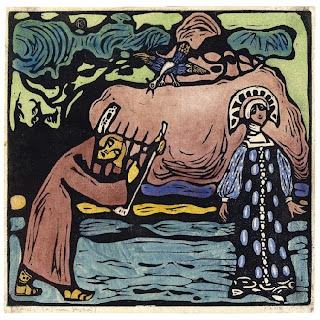
… so we have the Welsh example of a figure clad in green leaves with a quiver full of arrows and a hawk, clearly a hunter who is also able to enter a shepherd and inspire him to write poetry. A figure we can associate with Maponos or Mabon in a later development of his name.
And we have in Irish a figure who is transformed from all that is ugly to all that is beautiful and is identified as the spirit of poetry. A figure we can associate with Aengus Óg.Consider Aengus:
And as to Angus Og, son of the Dagda, sometimes he would come from Brugh na Boinne and let himself be seen upon the earth.
It was a long time after the coming of the Gael that he was seen by Cormac, King of Teamhair, and this is the account he gave of him.
[…..]. "And he was a beautiful young man," he said, "with high looks, and his appearance was more beautiful than all beauty, and there were ornaments of gold on his dress; in his hand he held a silver harp with strings of red gold, and the sound of its strings was sweeter than all music under the sky; and over the harp were two birds that seemed to be playing on it. He sat beside me pleasantly and played his sweet music to me, and in the end he foretold things that put drunkenness on my wits."
The birds, now, that used to be with Angus were four of his kisses that turned into birds and that used to be coming about the young men of Ireland, and crying after them. "Come, come," two of them would say, and "I go, I go," the other two would say, and it was hard to get free of them. But as to Angus, even when he was in his young youth, he used to be called the Frightener, or the Disturber; for the plough teams of the world, and every sort of cattle that is used by men, would make away in terror before him.(Lady Gregory: Gods and Fighting Men)
Now think of Maponus, or Mabon Son of Modron, the divine son, and consider that Maponus was associated with Apollo, that Mabon emerged from the darkness into the light of life. And consider how god identities might shift. So that Aengus Óg might walk the woods of Ireland in a similar guise. So for me it is Maponus at Midsummer. And it's not that he is, or he isn't a Sun God; not that he is or he isn't a Vegetation God ... and though he is certainly the god that plays the sweetest tune, he doesn't ask us to judge but to listen (though Apollo asked for judgement between himself and Pan, there was an element of asking for judgement between his new and his old self in that). He is the Awen, the spirit of Summer, youth transforming itself to the fullness of age but remaining ever young, the inspiration and the expiration of the Muse and he plays his music in what seems like an endless day.
And the Piper remains too:
He pipes all the wood through and fills it with magic
He fills every heart with a joy bursting free
On Midsummer morning when the wild pipes are calling
Oh! where but the greenwood could we wish to be.
Does a god have different identities in different places? Do gods ‘take on’ the identities of other gods? Do the other gods yet remain? Here are puzzles for Midsummer games. The key in which the music of the Master of the Revels is set might provide the answer, but it is not in his nature to offer neat solutions but rather to propose a conundrum that confounds those who seek such easy answers. His speech is not prose, but poetry; the sense of his song is the Summer.
3 comments:
Thanks for this Heron :)
Have you ever heard the Scottish lullaby Dream Angus?
"Dreams to sell, fine dreams to sell
Angus is here with dreams to sell
Hush ye my baby and sleep without fear
Dream Angus will bring you a dream my dear"
It's probably a fairly modern song but to me it taps into something older.
There's a version of it at:
http://www.kistodreams.org/dream_angus_g.asp
Thanks for the link Potia. Yes even though it's not an ancient song, I think the idea of Angus bringing dreams, incorporated into this lullaby, is a fascinating continuation of a tradition.
thanks for pointing me at this post again. Some of the things you say here are actually pertinent to some other things I've been thinking about too and was about to ask Potia about!
Do you have any special way that you mark the summer solstice?
Poetry not prose... that makes so much sense to me right now!
Post a Comment